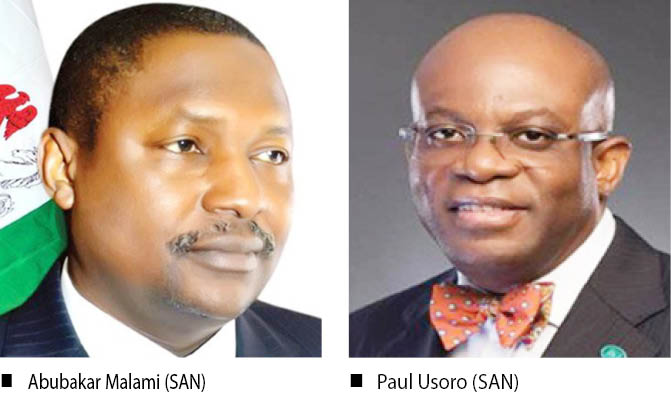Today, one of the most pressing debates is on the continued retention, or removal, of the immunity clause enshrined in section 308 of the 1999 Constitution of the Federal Republic of Nigeria.
Some lawyers said immunity for political office holders has not brought any good in the country, looking at the looting of the public treasury by politicians.
They cited the case of the former Governor of Abia State, Orji Uzor Kalu, who is one of the latest cases of former governors serving various jail terms.
In the case of Bola Tinubu vs. IMB Securities Plc (2001), the Supreme Court held that the immunity clause is meant to provide a shield for the person of the President, Vice President, Governor or Deputy Governor from frivolous or vexatious litigation in respect of personal or criminal proceedings that would distract him from the serious business of governance.
Daily Trust gathered that the doctrine of sovereign immunity has its origin from the English common law principle which is established on the maxim that “the king can do no wrong”. Of the three arms of government – Executive, legislature and the judiciary, the President the most superior being and, therefore, exempted from legal proceedings, obligations and liability which might occur while discharging some of his functions.
Constitutional lawyer and author, Sebastine Hon (SAN), said that without section 308, the protected officials would be unduly harassed, persecuted, and consequently distracted from performing their official duties.
According to him, arguments that this constitutional shield should be lifted so that bad elected officials could be dealt with fly in the face of other constitutional safeguards, including but not limited to the right of the electorate not to vote for them or the right of the legislature to have them impeached from office.
Barrister Ganiyu Folorunsho said that “the crime committed by various Nigerian governments since independence is immeasurable. Both the military and civilian governments have successfully organised extra judicial killings, genocide, illegal importation of arms, sponsoring militant groups and other grievous offenses against countless and defenceless Nigerians without facing trials.
“Similarly, both governments shared a common trait in flouting court orders and siphoning the country’s resources. The democratic dispensation is infamous for organising discreditable elections. Virtually every election is characterised by violence, arson, massive rigging in favour of the incumbent government or their anointed candidates. The state apparatus becomes a repressive instrument against dissenting voices, the public treasure turns to private assets and the nation with a groaning and dying people”.
According to Binzak Azeez, immunity clause is unethical for Nigerian’s political system, adding that all political leaders must be strictly held accountable for their brazen actions to resuscitate the country from wreckage.
“Immunity clause is a sharp contrast against natural law and equity. All are equal before the law and the law must be equal to everyone. No individual should be privileged or discriminated against all extant laws”.
In his opinion, the National Assembly and the state Houses of Assembly have failed woefully in exercising their constitutional roles of curbing executive excesses, rascality and gross misconducts.
Section 308 of the 1999 Constitution (as amended) currently stipulates: “Notwithstanding anything to the contrary in this constitution, but subject to subsection (2) of this section, no civil or criminal proceedings shall be instituted or continued against a person to whom this section applies during his period of office.
“A person to whom this section applies shall not be arrested or imprisoned during that period either in pursuance of the process of any court or otherwise; and no process of any court requiring or compelling the appearance of a person to whom this section applies, shall be applied for or issued.
“Provided that in ascertaining whether any period of limitation has expired for the purposes of any proceedings against a person to whom this section applies, no account shall be taken of his period of office.
“The provisions of subsection (1) of this section shall not apply to civil proceedings against a person to whom this section applies in his official capacity or to civil or criminal proceedings in which such a person is only a nominal party. This section applies to a person holding the office of president or vice president, governor or deputy governor; and the reference in this section to ‘period of office’ is a reference to the period during which the person holding such an office is required to perform the functions of the office.”
However, the Senate last week, introduced a bill that would alter the constitution and strip the president, his deputy, governors and their deputies of immunity from criminal prosecution.
According to the bill, which was sponsored by Deputy Senate President Ovie Omo-Agege, immunity will not apply “to persons who hold the office of vice president, governor or deputy governor, if it is determined either by the Economic Financial Crimes Commission, Independent Corrupt Practices Commission, Nigerian Police and State Security Service through a collaborative investigation that the said person is indicted by a court of competent jurisdiction for financial misappropriation of funds belonging to the federal, state or local government; or sponsoring of thugs to perpetrate violence that causes injury or death of political opponent, a member of his family, agent or personal representative.”
This latest bill is coming on the heels of the ill-fated bill seeking to grant immunity to principal officers of the National Assembly and State Houses of Assembly titled ‘Bill for an Act to Alter Section 308 of the Constitution of the Federal Republic of Nigeria, 1999, to Extend Immunity to Cover Presiding Officers of Legislative Institutions, sponsored by Olusegun Odebunmi, lawmaker representing Ogo-Oluwa/Surulere Federal Constituency of Oyo State.
According to Barrister Kehinde Sulaimon, the brouhaha surrounding the alleged immunity enjoyed by “lawmakers” is grossly misplaced, and the assault on Section 308 is unwarranted.
His words: “Our law enforcement agencies (Attorney General, ICPC, the Police and EFCC) should wake up to their responsibilities. Section 308 does not shield any member of the National Assembly from prosecution.”

 Join Daily Trust WhatsApp Community For Quick Access To News and Happenings Around You.
Join Daily Trust WhatsApp Community For Quick Access To News and Happenings Around You.


